
- Home
- India
- World
- Premium
- THE FEDERAL SPECIAL
- Analysis
- States
- Perspective
- Videos
- Sports
- Education
- Entertainment
- Elections
- Features
- Health
- Business
- Series
- In memoriam: Sheikh Mujibur Rahman
- Bishnoi's Men
- NEET TANGLE
- Economy Series
- Earth Day
- Kashmir’s Frozen Turbulence
- India@75
- The legend of Ramjanmabhoomi
- Liberalisation@30
- How to tame a dragon
- Celebrating biodiversity
- Farm Matters
- 50 days of solitude
- Bringing Migrants Home
- Budget 2020
- Jharkhand Votes
- The Federal Investigates
- The Federal Impact
- Vanishing Sand
- Gandhi @ 150
- Andhra Today
- Field report
- Operation Gulmarg
- Pandemic @1 Mn in India
- The Federal Year-End
- The Zero Year
- Science
- Brand studio
- Newsletter
- Elections 2024
- Events
- Home
- IndiaIndia
- World
- Analysis
- StatesStates
- PerspectivePerspective
- VideosVideos
- Sports
- Education
- Entertainment
- ElectionsElections
- Features
- Health
- BusinessBusiness
- Premium
- Loading...
Premium - Events
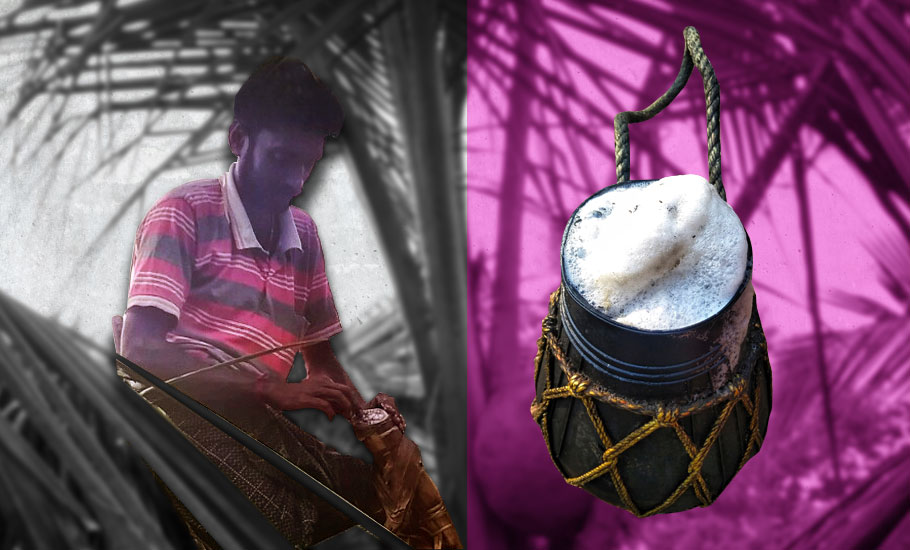
Usually in high spirits, Kerala's love for toddy is wearing off
Once a favourite of the locals in Kerala, toddy consumption has been seeing a steady decline over the years, thanks to many factors, including a decline in interest among the youths of today.

“Business is not as good as it was before, but we are slowly recovering,” says Babu, an award-winning toddy tapper from Ottappalam in Palakkad district of Kerala, who along with other workers reopened shops after a three-month hiatus. Back in March, about 100 shops were ordered to be shut in the district for allegedly selling adulterated toddy (mixed with spirit) in the wake of...
“Business is not as good as it was before, but we are slowly recovering,” says Babu, an award-winning toddy tapper from Ottappalam in Palakkad district of Kerala, who along with other workers reopened shops after a three-month hiatus.
Back in March, about 100 shops were ordered to be shut in the district for allegedly selling adulterated toddy (mixed with spirit) in the wake of the COVID-19 lockdown.
Around three months later when the government relaxed restrictions, Babu, who has won the best toddy tapper award three times, and other toddy workers met the district collector and convinced the authorities to let them reopen the shops which they would run themselves.
But, as he says, the business is only slowly reviving. Babu says for a diligent worker, toddy tapping is a lucrative affair. A tapper usually gets 10–15 litres of toddy a day, but those who are ready to do hard work can tap 100 litres a day, he says.
For a state known as God’s own country for its nature tourism and its high per capita alcohol consumption, things should look up in a few months, but toddy trade things may not be so rosy.
Once a favourite of the locals, the consumption has been seeing a steady decline over the years — in fact, it has been declining since the 1960s, if one goes by government data.
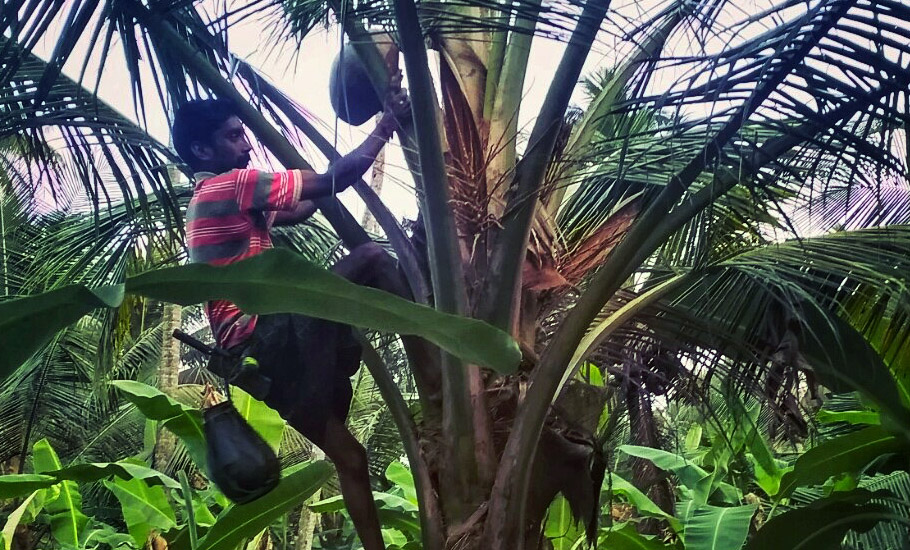
The Udayabhanu Commission’s report on the consumption of liquor in Kerala shows that the per capita consumption of toddy in Kerala declined from 5.42 litres in 1962 to 3 litres by 1982.
On the other hand, the total consumption of liquor has been on the rise and the income from excise duty too has grown considerably. Kerala has the highest per capita consumption of liquor in India.
This is despite 4,464 toddy shops and 12,000 registered toddy tappers in Kerala and an average of 3 lakh litres of toddy being produced every day, according to the Toddy Worker’s Welfare Fund Board.
Mixed factors
This downward trend has many factors. The primary issue many toddy lovers say is the loss of purity in their favourite drink.
Adulteration has become common, with sellers even mixing ganja (cannabis) in it besides other intoxicants. Deadly chemical concoctions locally known as ‘Elephant sedative’ have also been used to enhance the intoxication.
This has been a cause of concern especially in the time of the pandemic due to the low availability of pure toddy due to the restrictions imposed.
But even before the pandemic, the shortage of pure toddy has been felt and this has been linked to the decline in coconut farming in Kerala.
“Coconut farming has been hit by various plant diseases. It has become unviable,” says Joseph Chacko who used to be a coconut farmer in Thrissur who has sold his land for a commercial establishment to come in its place, a trend that has been seen among coconut farm owners over the past several years.
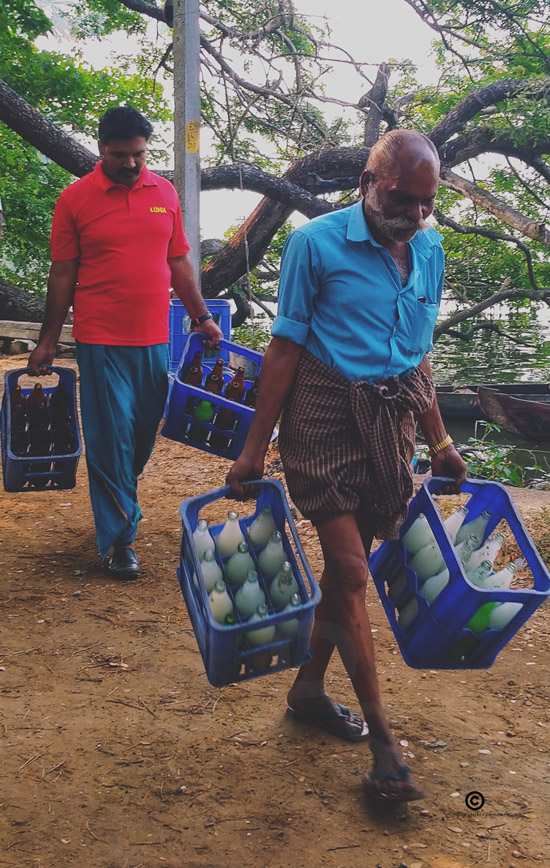
Labour and class
But Chacko notes that there is also a paucity of workers for plucking coconut which is adding to the costs and concerns of coconut farmers.
Historically, toddy tapping has been a caste occupation in Kerala done by the Ezhava community in Kerala, which has been considered a lower caste and has been referred to derogatorily.
The abusive caste reference related to toddy tapping has even been used against Chief Minister Pinarayi Vijayan by detractors. He has often been abused as the ‘son of a toddy tapper’ referring to his caste.
The Chief Minister had responded sharply to this, saying, “My father was a toddy tapper, my brothers too. Some people think that I also should do that job, they should understand that those times are over.”
But it is unlikely that youngsters would overlook the insult and discrimination, especially the Ezhava community, and so — besides the financial aspects — may not find such traditional occupations lucrative. They would keep away even though their fathers, uncles or elder brothers would be into it.
This argument is said to be true among young consumers too. Toddy is identified as the drink of the ‘working class’. Toddy shops do not have the ‘sophistication and ambience’ of a bar where the middle class prefer to go.
While in the past, youths would take to having cheap ‘kallu’, as it is locally referred, nowadays, they go for higher end alcohol, including foreign liquor, thanks to the higher income they are able to earn.
The shift in economy brought about by globalisation has affected the traditional industry in certain ways.
“The opening of more bars and beer parlours and the construction boom in the state has accelerated the crisis,” says GK Gireesh Mon, general secretary of Welfare Fund Board Employees Union.
The inflow of foreign currency and the upward mobility acquired by the people have brought a fundamental shift in the class character which further narrowed down the love for toddy.
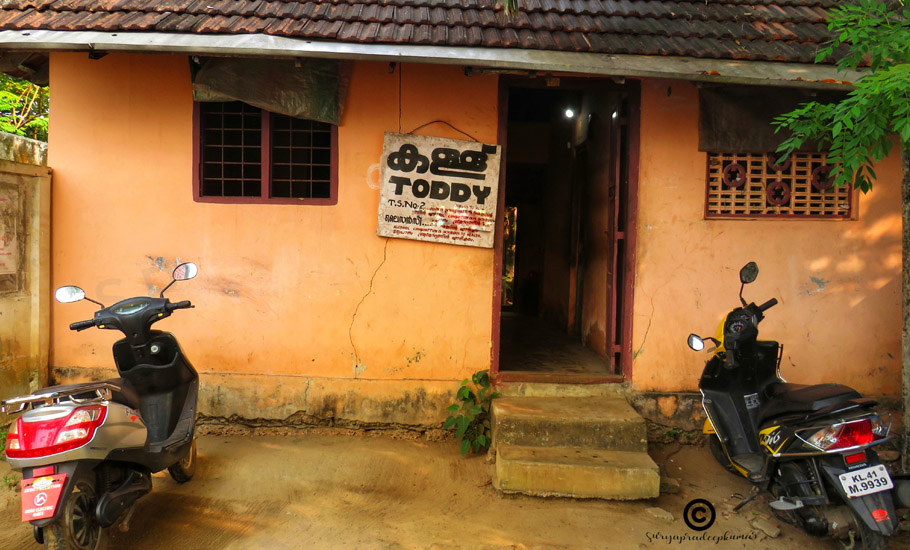
Politics and religion
The Communist Party in Kerala has an umbilical cord relationship with the traditional industries such as coir and toddy, having found thousands of its foot-soldiers among the workers in these industries.
The party helped backward communities lift themselves up socially, economically and politically, especially the Ezhavas, as a result of this.
Toddy is also considered the favourite drink of Lord Shiva, according to mythical stories about the origin of toddy. Lord Muthappan, worshipped in northern Kerala, is believed to be the incarnation of both Vishnu and Shiva and toddy is given as an offering by devotees in Muthappan temples in Malabar.
But this ancient mythical association took a beating after toddy consumption led to rowdy behaviour and violent clashes.
But whether the association is divine or Communist, the youngsters are moving away, looking for greener pastures.
Poor shelf life
Another factor that any toddy seller would point to is the lack of shelf life of the intoxicant.
“As toddy does not have shelf life, this is one of the worst-hit industries hit by the pandemic,” says Biju, Welfare Fund Inspector at Kollam.
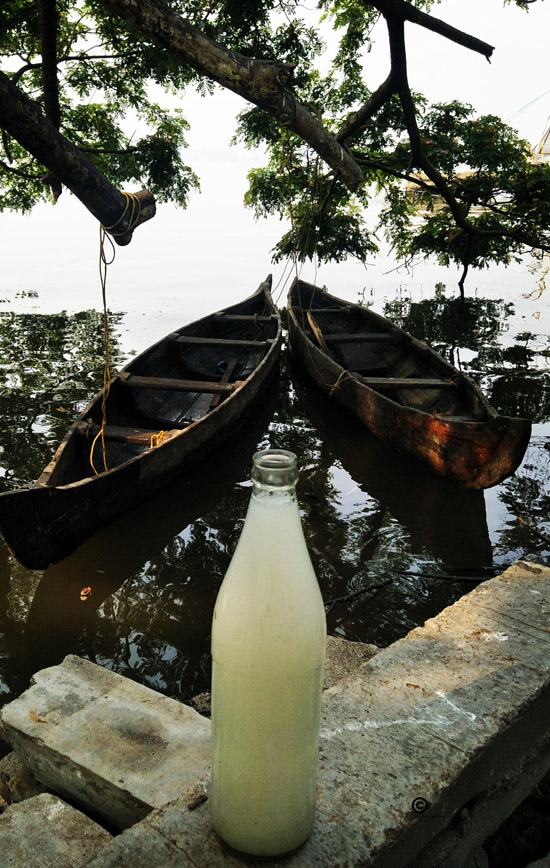
Toddy is made by the fermentation of the flower sap of coconut palm and is distilled and taken, and so it has a short shelf life of about 24 hours, which can be extended for some time if refrigerated.
During the lockdown, this affected toddy trade badly as there was no way to extend its life. There have been no scientific or technological solutions to enhance its shelf life. Although the Kerala Agriculture University has initiated some research, it has yielded no result yet.
Overall, this factor puts it at a great disadvantage against other types of liquor like whiskey, rum or brandy, which have become the go-to choice of the young and the well-off.
No govt support
“The governments in Kerala (both LDF and UDF) have taken many steps to rejuvenate other traditional industries as coir, handloom and cashew. But the toddy industry has never received that priority,” says Gireesh, alleging that the toddy industry has been neglected even as the subsequent governments gave priority to other sectors of the liquor industry.
The required distance of a bar from a school or worship place is set as 50 metres. On the other hand, toddy shops have to keep a minimum of 200 metres from such institutions.
Toddy workers say that they do not understand the rationale behind it. “The alcohol content is only 6–8 per cent in toddy but more stringent rules are applied on the toddy industry,” says Biju.
Pure toddy is seen as a healthy drink. The Udayabhanu Commission that looked into the practicality of a liquor ban had recommended supporting the toddy industry so as to make pure toddy available to consumers.
Like ‘Goan Feni’, Kerala’s toddy has the unique potential to attract tourists if the availability of pure toddy is ensured.
Rebranding for modern tourists and youths
Some feel that the tourism potential should be exploited by tapping the popular image of toddy shop food, which is said to have a variety of most delicious cuisine.
Sam Jacob, a member of the Worker’s Welfare Fund Board at Ernakulam, says that a fundamental face-lift is necessary for rejuvenating the industry.
The buildings have to be renovated providing clean toilets and good ambience sufficient enough to attract families.
‘Mullappanthal’ a toddy shop at Thrippunithura in Ernakulam that has been documented in many food vlogs is an example of this type rebranding.
Mullappanthal offers a wide variety of seafood in addition to elaborate choices of other vegetarian and non-vegetarian items.
As CM Pinarayi Vijayan said, “Those times are over”, the good times for toddy trade could be all but over unless it looks at ways to revive.
